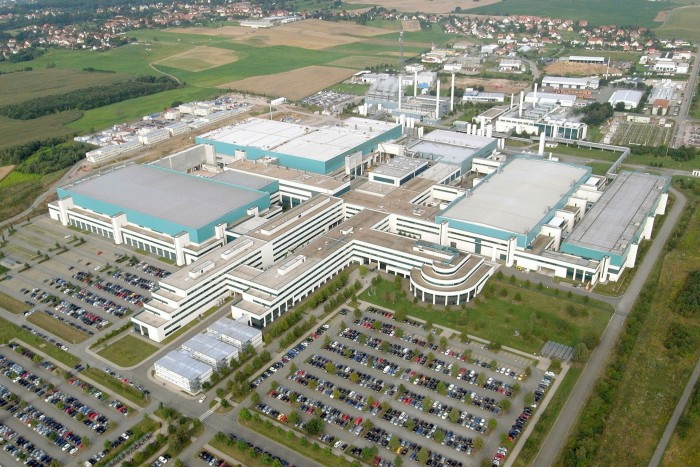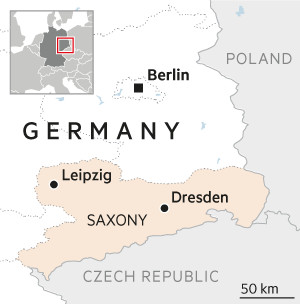Until a shortage of semiconductors throttled the supply of everything from cars to games consoles this year, few in Europe gave much thought to the GlobalFoundries factory in Dresden, the EU’s largest chip plant.
“I did not have any [media] interviews in the first 18 years of my career — nothing,” said Guido Uberreiter, an engineer who oversees operations at the site in the heart of former communist east Germany. “Nobody was interested.”
Now the GlobalFoundries plant — which makes chips for devices from the Apple Watch to Samsung smartphones and the Amazon Echo — and others in the state of Saxony are firmly in the spotlight, as Brussels looks to strengthen Europe’s semiconductor supply chains and reduce its reliance on dominant Asian producers such as Taiwan Semiconductor Manufacturing Company.
Governments across the world — particularly in the US, South Korea and Japan — have pledged tens of billions of dollars in support for the building or expansion of semiconductor factories in an effort to reshore production of the crucial components. Companies and regions in need of investment have been clamouring to become the beneficiaries.
Germany hopes “Silicon Saxony” — which accounts for one in every three chips made in Europe — will be at the heart of EU efforts.
“Saxony will become one of Europe’s main and most advanced industrial and technological semiconductor centres,” said Thierry Breton, the EU’s commissioner for the internal market, on a visit last month.
Breton is behind the EU’s proposed Chips Act, which aims to double Europe’s global market share for semiconductors to 20 per cent by the end of the decade. Germany’s new Social Democrat-led government has also pledged to offer the sector “sufficient financial support along the entire value chain in order to secure, strengthen and expand this key technology”.
But industry figures in Saxony see plenty of remaining questions about the EU’s commitment to the region, whose semiconductor cluster rose up in the 1990s, when the area was awash with unemployed microelectronics experts trained by the former German Democratic Republic.
The region has been burnt by politicians’ fading interest before. While Taiwan was shoring up the semiconductor sector with nine-figure subsidies at the turn of the century, European support for the capital intensive industry remained modest.
As recently as 2009, Dresden-based memory chipmaker Qimonda — one of the world’s largest — filed for bankruptcy after struggling to compete with Asian rivals despite appeals to the European Commission for support.
“Qimonda wasn’t saved, [carmaker] Opel was saved,” said Frank Bösenberg, managing director of Silicon Saxony’s representative body, which lobbies on behalf of 370 institutions. “Whose belts are standing still right now due to the lack of semiconductors?” he said, referring to Opel’s production lines.
Furthermore, the EU’s stated ambition is to invest particularly in the most cutting-edge chips which, according to the Chips Act proposal, are “10 times more energy efficient than today”.
Member states such as Italy, and individual German states have been wooing America’s Intel, which plans to spend tens of billions of euros on “fabs” — chip plants — in Europe, to manufacture advanced, two nanometre semiconductors.
Neither US-listed GlobalFoundries, nor Bosch and Infineon, German companies with plants near Dresden, make such devices.
Yet these producers’ commonplace power, connectivity and sensor chips are vital for Europe’s automotive and consumer goods manufacturers, which have lost billions of euros in revenues as a result of the semiconductor shortage.
Uberreiter and his competitors hope lawmakers in Germany and the wider EU will see the value in their companies’ technology and invest in its expansion to prevent further bottlenecks despite the higher costs of doing business in Europe.
“If you look at these things,” he said, waving his smartphone, “there’s exactly one chip that is the most leading-edge, shiny thing, and then there are 46 others.”
Promoters of Saxony said the companies here had also created a chips “ecosystem” that benefited established companies and could attract smaller, cutting-edge entrants to the area.

One such business is Arioso Systems, a start-up based in the former premises of an East German computing company. A spin-off from the nearby Fraunhofer Institute for Photonic Microsystems, a research body, Arioso is trying to use silicon to produce sound in wireless earbuds such as Apple’s AirPods, rather than a traditional coil speaker.
“We don’t have a membrane that is moving, we have cantilevers, which move and squeeze the air out of the chip,” said engineer Lutz Ehrig, balancing a tiny chip on the tip of his finger.
Making the technology relies on collaboration with semiconductor factories in the area, but it is personnel, rather than plants, that Arioso is struggling to find. Local demographics are unhelpful — 9 of the 10 oldest regions in Europe are in eastern Germany.
“Most of the applications we get are from India and Pakistan,” said managing director Hermann Schenk. “We can’t get enough people [locally].”
Global recruitment is key to Silicon Saxony’s aim to increase the number of workers in the semiconductor sector from 70,500 to 100,000, and for the industry to overtake carmakers as the biggest employer in the state. Employees at GlobalFoundries, for example, hail from more than 40 countries.
“We will need more immigration,” said Bösenberg. The rise of the far-right, anti-immigration AfD party in Saxony, he said, may be hindering efforts to attract the most qualified candidates.
In September’s general election, ten of Saxony’s 16 constituencies voted to directly elect AfD candidates.
Given current polling, local elections in 2024 could result in the AfD’s overtaking the Christian Democrats to become the largest party in Saxony’s parliament, potentially handing them control of the state budget.
With less than 60 per cent of its citizens double vaccinated, Saxony also consistently posts record high numbers of new Covid-19 cases.
“We have to fight this perception,” said Bösenberg, dismayed at the reputation the state has gained in recent years. “We are in competition with each and every German region . . . we need a more positive image”.











